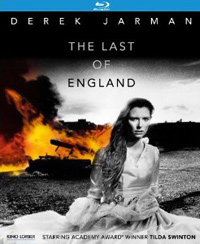 Looking back at Derek Jarman’s 1987 experimental manifestation of the loss of traditional English culture, The Last of England, his creation remains an incredibly unconventional, but highly personal semi-narrative that cuts through a scorched Earth left behind by Margaret Thatcher and the AIDS epidemic. The film is lined with his thematic staples of explicit homoeroticism and the punk movement that he was so much a part of during the 70s. With help from his longtime on screen collaborators Tilda Swinton, Spencer Leigh and Nigel Terry, Jarman made a return to the Super 8 format for its low cost and political freedom, and with it found the format fitting of the kaleidoscopic nightmare he managed to mold. His often manically abrasive, sometimes hauntingly vexatious aesthetic serves an imperative purpose, but man, is it hard to watch.
Looking back at Derek Jarman’s 1987 experimental manifestation of the loss of traditional English culture, The Last of England, his creation remains an incredibly unconventional, but highly personal semi-narrative that cuts through a scorched Earth left behind by Margaret Thatcher and the AIDS epidemic. The film is lined with his thematic staples of explicit homoeroticism and the punk movement that he was so much a part of during the 70s. With help from his longtime on screen collaborators Tilda Swinton, Spencer Leigh and Nigel Terry, Jarman made a return to the Super 8 format for its low cost and political freedom, and with it found the format fitting of the kaleidoscopic nightmare he managed to mold. His often manically abrasive, sometimes hauntingly vexatious aesthetic serves an imperative purpose, but man, is it hard to watch.
We move through time at an expedient rate – actually, dizzying is more accurate. Nearly all of Jarman’s subjects move in blurred hyper speed, dancing amongst the rubble of English past or sitting imprisoned by gun toting masked men, set to a mish mash of musical numbers and a variety of ominous quotes from Allen Ginsberg and T.S. Eliot. His hand held camera work shakily maneuvers at a moments notice, constantly inter-cutting with equally jarring imagery. Though not structured into defined chapters, there are certainly visual shifts that mark a change in subject – punk squatters living out of dilapidated structures, to faceless military militia taking over, to homoerotic breakdowns between each of them – but nearly all of these events retain the film’s most memorable symbol – burning wreckage.
As a product of the late 80s, the feature was obviously heavily influenced by the rise of music videos, taking leads throughout for editing cues and loose narrative centerpieces. There are several sections of the film that actually feel like a full music video, one in which a man is dressed awkwardly in a ballet tutu with makeup to boot. The same images flash and repeat to a pulsating synthesized track, and when the song ends we shift to a completely new sequence. This technique is repeated in the film, often pairing it with extremely fast cuts that contrast the imagery of childhood innocence with masked gunmen, flaming structures and explicit nudity.
Visceral visual poetry, The Last of England will certainly leave a mark on your psyche, but as a film wanting multiple visitations, it probably won’t make the cut. Jarman’s philosophic vision is a grueling experience, with its raw intensity amped by sped up, ultra shaky footage that only really hits home in its final sequence. In the end, Tilda Swinton’s character, in the wake of her marriage, stands on the shore of a burning beach, ripping her wedding dress to shreds and spinning with reckless abandon as the wind whips through her hair, bathing her in black smoke. Throughout the entire film it is clear that Jarman feels that as a culture we’ve traded in our wholesome values and accepted our true barbaric nature, but in this dreamlike sequence, it sinks in, and it leaves us feeling uneasily regretful.
The Disc:
For the HD re-release of this monumental film, Kino has surprisingly gone bare bones. The disk lacks any special features what-so-ever, but luckily, the film really benefits from the remastering and added resolution. Despite being shot on gritty Super 8, the rough looking footage gets a massive boost in clarity and detail, and looks quite striking here. Going with the original form, the film’s audio comes through a vibrant stereo track that pushes out a variety of crystal clear genres of electronic and classical music, as well as Nigel Terry’s animated overdubbed readings. The disc itself comes packaged in a standard Blu-ray case.
Final Thoughts:
Derek Jarman, for as important a filmmaker as he is for his unrelenting support for gay rights, AIDS awareness and the British punk movement, his earnest films are sometimes grating undertakings, and The Last of England is a sterling example of this. The feature, unlike most of its contemporaries at the time, bares the director’s soul, even inserting some authentic childhood family footage, and in doing so submits to the sea change, and admits the chaos of such change in the good of sexual liberation and the bad of restricted personal values. Somewhere within this visual anarchy, there is brutal truth of cultural and historical importance. You’ve just got to do some of the heavy lifting to unearth it.


